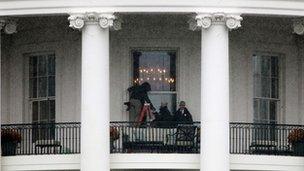Who, What Why: How many buildings have bullet-proof windows?
- Published

Officers are investigating after shots were apparently fired at the White House
A man has been arrested after shots were fired near the White House. One of the bullets was apparently stopped by protective glass. How many other buildings have bullet-proof windows?
There is no such thing as bullet-proof glass. Industry experts all stress that it is not possible to make windows that provide complete protection from gunfire.
"Only our name is bullet-proof," says Ken Sampson, owner and founder of United States Bullet Proofing Inc.
"The term we prefer is bullet-resistant. They can always come back with a bigger gun."
Demand for Mr Sampson's products has "quadrupled" over the past two years, he says, as the US economy has turned sour.
Jewellery stores, liquor stores, banks and other businesses which fear they could be the target of gun crime have all found the need to step up security.
At the same time, local police stations and court houses have been "lining their lobbies with ballistic armour", says Mr Sampson, and replacing toughened glass in customer booths with bullet-resistant glass, which in some cases is 5.7cm (2.25in) thick.
But the windows at high-security buildings in Washington DC and other capital cities around the world are very different to those used to protect the cashier in a bank or corner shop.
They are designed to resist high-velocity rifle fire, as well as bullets from hand guns, and are manufactured to a higher standard than those used for most commercial premises.
That means more layers of glass, although thickness is not everything, industry experts say, and recent advances in technology have made it possible to produce thinner and lighter transparent armoured material.
The other crucial difference is that they are blast proof.
Blast protection
Bomb attacks on buildings have the potential to produce greater carnage than gunfire, with flying shards often proving more deadly than bullets.
That is why all new government buildings in the US now have to be built with blast protection, which can also include measures to prevent hurricane damage and forced entry.
But windows that are also bullet-resistant remain relatively rare on the outside of buildings, due to the perceived lack of threat from gun fire and the cost of installing them.
"You have different levels of bullet resistance depending on the threat level," says Scott Haddock, president of Glasslock and trade body the Protective Glazing Council.
But he refused to be drawn on how thick the windows in the White House or other high security buildings in Washington DC might be.
"I have products that I cannot talk about or advertise, which is kind of frustrating, but my customers would expect me to protect their best interests," he said.
Heavy laminated glass - sometimes up to 10.2cm (4in) thick - has been used in armoured cars and buildings to protect against bullets since the Second World War.
High-velocity rifle
It is made by gluing thin sheets of glass together with polyurethane or ethylene-vinyl, but it can cost up to 10 times more than conventional glass, and buildings in which it is used have to be reinforced to bear the extra weight.
A lighter alternative that is sometimes used is polycarbonate thermoplastic layered between sheets of glass.
The National Institute of Justice of armoured glass used in US government buildings.
Ratings are based on the number rounds fired into the glass and the size of weapon, from small-calibre hand guns to high-velocity rifles.
But experts stress that the strength and design of the window frame can be just as important when it comes to offering protection.
Shots have been reported in the past near the White House, although they have usually turned out to be false alarms and, to date, no gunman has ever succeeded in penetrating its armoured glass.
- Published14 November 2011
- Published23 August 2011
- Published18 August 2011
- Published16 November 2011